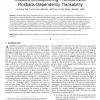Free Online Productivity Tools
i2Speak
i2Symbol
i2OCR
iTex2Img
iWeb2Print
iWeb2Shot
i2Type
iPdf2Split
iPdf2Merge
i2Bopomofo
i2Arabic
i2Style
i2Image
i2PDF
iLatex2Rtf
Sci2ools
TPDS
1998
1998
Theoretical Analysis for Communication-Induced Checkpointing Protocols with Rollback-Dependency Trackability
—Rollback-Dependency Trackability (RDT) is a property that states that all rollback dependencies between local checkpoints are on-line trackable by using a transitive dependency vector. In this paper, we address three fundamental issues in the design of communication-induced checkpointing protocols that ensure RDT. First, we prove that the following intuition commonly assumed in the literature is in fact false: If a protocol forces a checkpoint only at a stronger condition, then it must take, at most, as many forced checkpoints as a protocol based on a weaker condition.This result implies that the common approach of sharpening the checkpoint-inducing condition by piggybacking more control information on each message may not always yield a more efficient protocol. Next, we prove that there is no optimal on-line RDT protocol that takes fewer forced checkpoints than any other RDT protocol for all possible communication patterns. Finally, since comparing checkpoint-inducing conditions is...
| Added | 23 Dec 2010 |
| Updated | 23 Dec 2010 |
| Type | Journal |
| Year | 1998 |
| Where | TPDS |
| Authors | Jichiang Tsai, Sy-Yen Kuo, Yi-Min Wang |
Comments (0)

